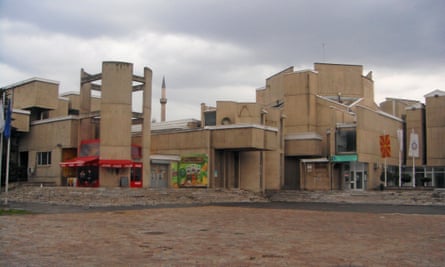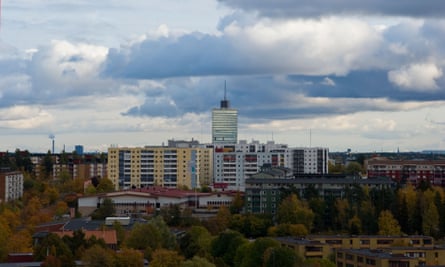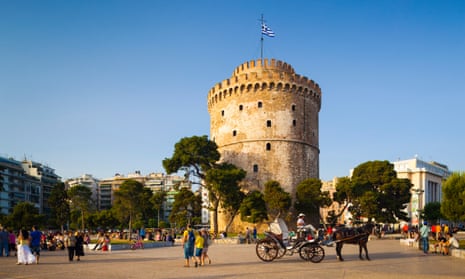A few days after the EU referendum, Owen Hatherley visited his home city of Southampton and got into a blazing row with his mother about the result. He had voted to remain, and she to leave. Hatherley’s mum was not a red-faced patriot but a Lexiter: a leftwing activist who wanted Britain out of the bosses’ club. For his part, “irrational” though it seemed, “the reason I wanted to stay in the European Union was architectural”.
In the last two years Hatherley has visited dozens of cities in what he loosely terms “the European subcontinent” – not all of them in EU countries – in an attempt to figure out why he associates most of Europe strongly with “good architecture”, and Britain with measly, cynical buildings that speak less of human achievement than capitulation to the bottom line. Brexit provided a timely way for this thoughtful and refreshingly idiosyncratic writer to blend his two preoccupations, politics and buildings.
Hatherley’s theory, which this book not so much tests as pummels furiously for signs of weakness, is that for all its evident problems, belonging to Europe means – or meant – committing to an idea that everyday life can be made better for the vast majority of people with planning, humility and a good measure of collective provision. Europe, he reckons at the outset, reminds him of fast, comprehensive public transport, generous and affordable rented housing and public spaces that you want to spend hours in rather than hurry through.

Deep down he knows that any time you find yourself getting close to a definition of Europe that includes “being more civilised” than other continents, it’s a good idea to step away. As a critic and historian Hatherley has made his name by taking apart, with humanity and wit, our casual assumptions about the built environment: in his own words, by treating “architecture and city planning as a deeply loaded subject, one from which it is easy to read the complexities of European history”.
Trans-Europe Express begins by detailing, among other things, the construction of the modern state of Greece and the barely imaginable violence of King Leopold’s domination of the Congo, which, Hatherley records, was pillaged primarily in order to make “the shabby mercantile city” of Brussels look nicer. “Europe” looks civilised because of its knack for turning violence into gold.
The reader is invited to read his pithy, graceful dispatches in any order. Hatherley’s pilgrimages from our shabby mercantile country often take him to the things he most appreciates: he is drawn to some of the best examples of public housing you’re likely to find anywhere in the world, such as the “awe-inspiring” Split 3 district in the Croatian capital, and the “forest fragments” landscaped into Berlin’s Waldsiedlung and Stockholm’s Husby district.
It’s in Husby that he comes up against some of the social friction that hints at the stickier reality of frictionless Eutopia. A group of residents of Husby, with its metro station and pretty housing, rioted for 10 days in 2013. The reason you get riots in Sweden, as a Stockholm resident tells Hatherley, is segregation by race and class: “Stockholm is the most segregated capital city in Europe ...” One can only wonder at the level of segregation in Stockholm if it’s worse than Paris, where Hatherley finds “white boulevards full of solely white people”. and a transport system divided into “RER for the proles”, condemned to 90-minute commutes, and Métro for the two million posher, whiter Parisians within the ring road.

In sections on Thessaloniki and Trieste he demolishes the idea that Europe’s cities are historically monocultural, and that ethnic and religious diversity is a new “problem” that Europe has to “solve” or “manage”. Trieste has, he writes, a “multicultural architecture; it does not – except in the case of very recent migrants, about whom there is an unseemly panic – have a multicultural present”.
Do Europeans – in EU member states and otherwise – really believe panic is the best response to the human optimism, ingenuity or desperation that leads to migration? Do we really think that’s the best way forward? Visiting Skopje, the Macedonian capital, he contrasts the modernist achievements of the Museum of Contemporary Art and the Cyril and Methodius University with the results of a bizarre plan to “antiquitise” the city centre and therefore make it “more European”.
There is, on the one hand, the Europe that collectively donated designers and materials to the Macedonian government after the 1963 earthquake that destroyed most of “old” Skopje – which it is trying to recreate. On the other, there is the Europe that ruthlessly dictates the economic fortunes of its poorer members, which promoted frictionless borders in the service of capital, only to create new ones in the name of “stability” and “security”. Hatherley knows which one he’d rather be living in, as do I.

Comments (…)
Sign in or create your Guardian account to join the discussion